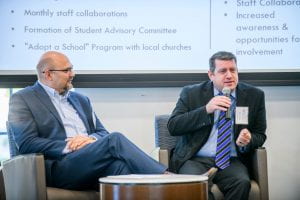“The community and its schools are not separate” – Regina Nippert
“This is a subject that has not only been central to my professional career, it’s a subject about which I have deeply held core beliefs: that the community and its schools are not separate,” said Regina Nippert as she kicked off the opening panel of the first annual Rural Superintendent Leadership Symposium, hosted on the SMU campus by the Institute for Leadership Impact. Ms. Nippert, who serves as Executive Director of the Budd Center at SMU, moderated the panel featuring four superintendents from two East Texas counties, who presented several approaches to increase community engagement in rural school districts.

Dr. Chris Moran, superintendent of Whitehouse ISD, spoke first. He noted that sustaining a productive relationship between a community and its school district requires the district to adapt as the needs of the community. Dr. Moran found that “the more we discussed our core beliefs as a community, the more input we received from members of our community – parents, faith leaders, business leaders – the more we recognized that the mental health and well-being of our students was at the very center of what we wanted to pursue.” This realization led him to lead the creation of a district-wide initiative focused on scaling up mental health counseling services for all students who would benefit from them, with the goal of creating a safer and more caring campus environment for all community members. Along this journey, Dr. Moran built a partnership with the neighboring University of Texas at Tyler, developing a plan to place mental health counseling interns from UT Tyler at each WISD campus and hiring a mental health counselor to oversee the interns.

Concurring with Dr. Moran’s emphasis on student success, Dr. Darin Jolly (North Hopkins ISD) remarked on the critical role that schools can play in rural communities. To stimulate more involvement in his own district, Dr. Jolly leveraged the philosophy of “If we build it, they will come” to establish a Vision Committee to encourage stakeholder involvement, begin hosting staff collaboration sessions, form a Student Advisory Committee, and launch an “Adopt a School” program with local churches. In the short term, Dr. Jolly plans to use these tools to identify and pursue new opportunities for community engagement.

To ensure that community engagement opportunities are available to students as well as community members outside the school system, Dustin Carr (Sulphur Bluff ISD) focused on creating leadership opportunities for more students. He identified the Beta Club as an appropriate way to make these opportunities available, and set a goal of introducing the club at Sulphur Bluff Junior High. Ultimately, he hopes to build a robust Beta presence on campus and begin sending students to Beta conventions, as well as creating new opportunities for service projects to continue improving community engagement and student success.

Marc Levesque, superintendent of Chapel Hill ISD, concluded the presentations by stressing the importance of community-based accountability with his “All About the A’s” model. Through the creation of internal assessment and accountability systems – as well as innovation in curriculum and instruction – Mr. Levesque plans to elevate CHISD to excellence in academics, arts, agriculture, athletics, advocacy, and accountability, in ways that address the unique needs and interests of the community. He remarked that the success of rural schools should be a point of pride and that he is thankful to partner with SMU and other districts to continue enhancing the student experience.